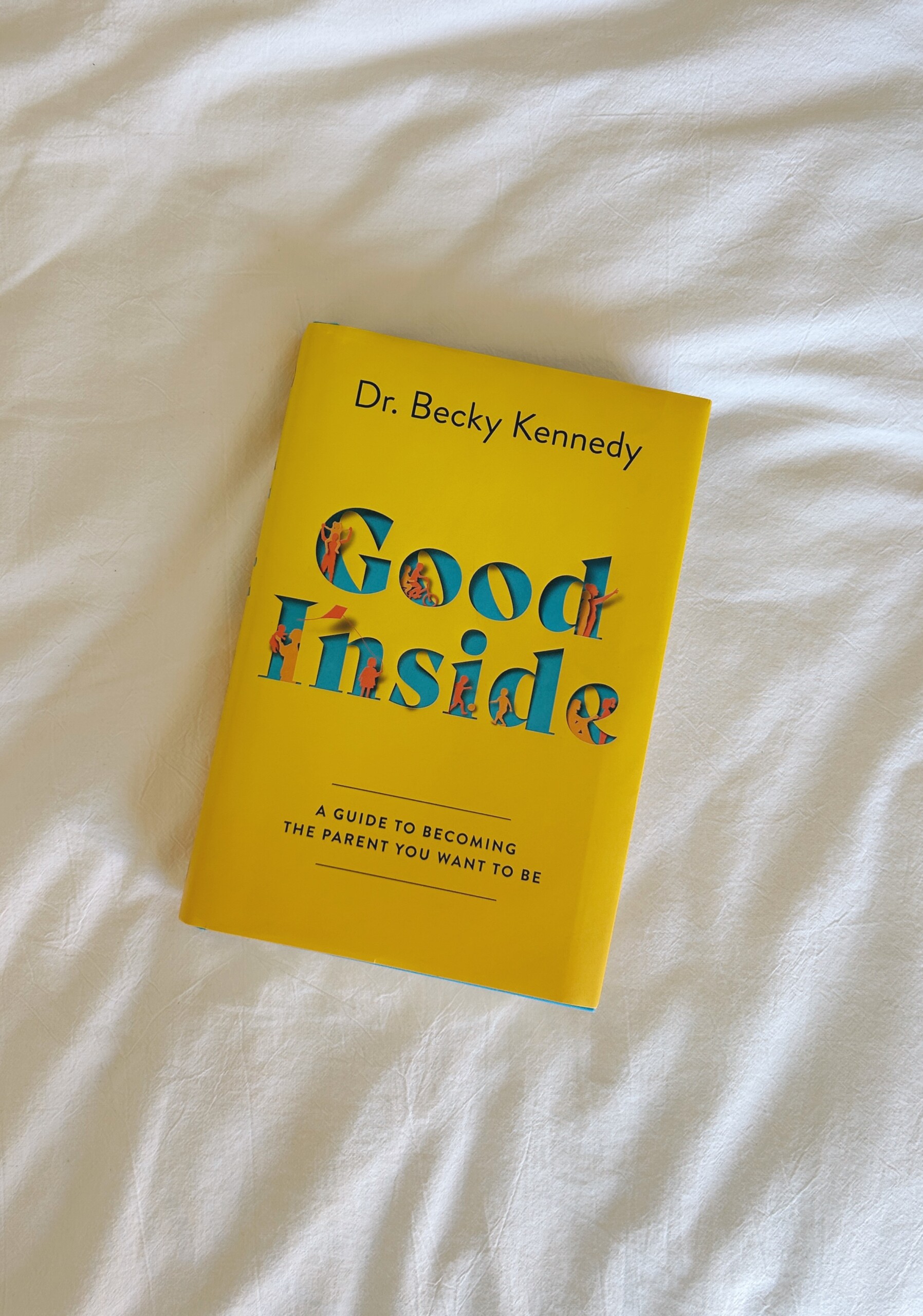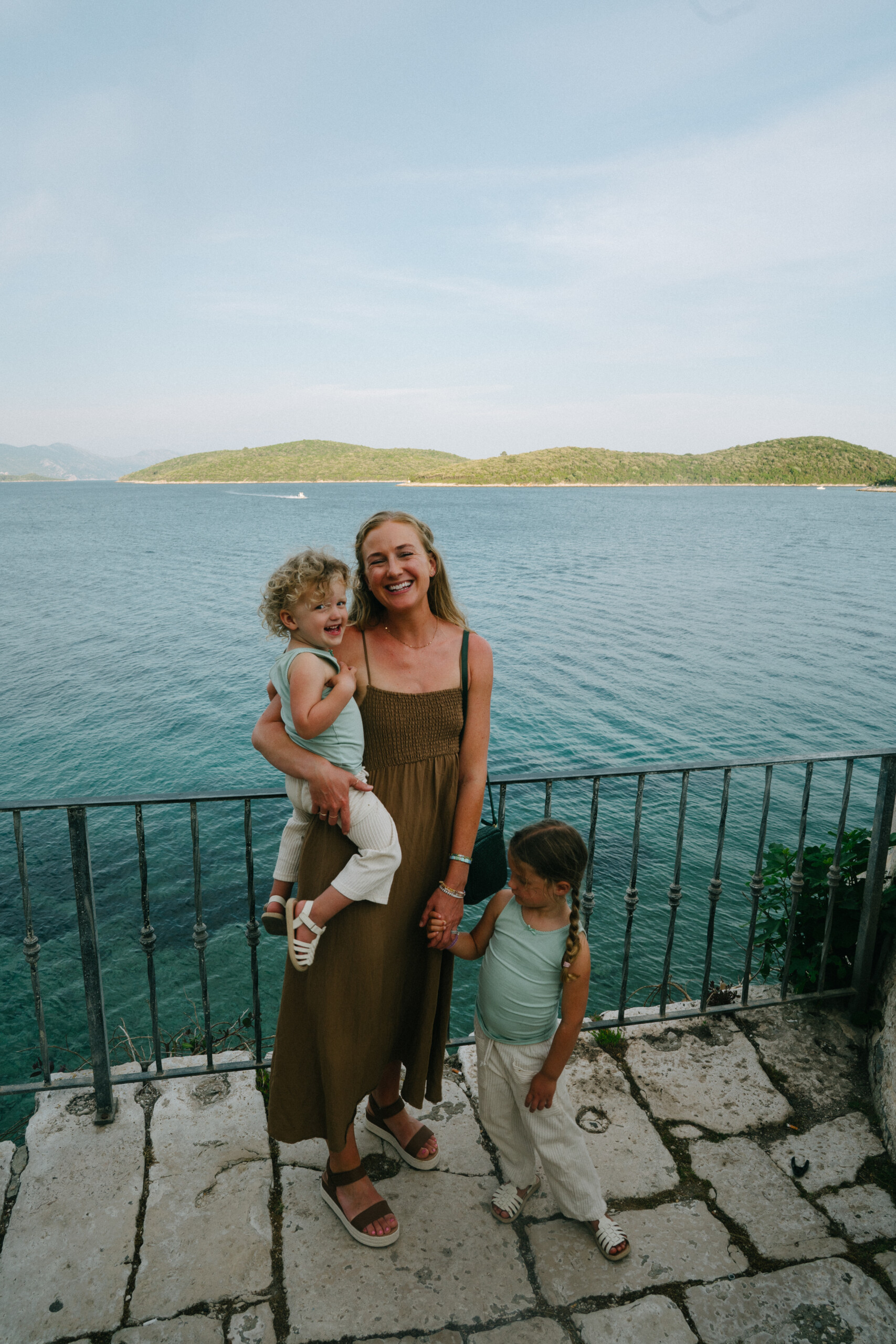Today I’m sharing my thoughts on the book Good Inside: A Guide to Becoming the Parent You Want to Be by Dr. Becky Kennedy.
I read this book last month and felt like I had way too many thoughts to squeeze into a blurb for my Friday morning newsletter (sign up here if you’re not already!). I decided to put together a blog post reviewing the book. I’m also going to share some of the biggest things I learned from it.
(I’ve done this type of post just once before–you can check out The Artist’s Way book review here).
Good Inside details a parenting approach that is grounded in empathy. In the book, Dr. Becky walks through her basic principles of raising resilient, emotionally healthy kids while also providing a safe space for stressed out parents to land. She teaches parents how to set boundaries from a place of compassion. Dr. Becky explains that choosing to believe that our kids are good can fundamentally improve our relationships and communication with them.
There is no shortage of parenting advice on social media. Every time I log onto Instagram, there’s another reel screaming at me, “Stop doing ____ with your baby!” or “Stop saying ___ to your kids!” It can be overwhelming to try to make sense of all of the tiny sound bytes and captions. Especially because all of these parenting experts seem to have a different opinion.
Dr. Becky does a great job of getting to the core of parenting in this book which I really appreciate.
Dr. Becky Kennedy’s Good Inside Book Review
I have read quite a few parenting books. (Check out my faves under the “Parenthood Starter Pack” category on my books page.) What makes this book unique is that it really forced me to look inward. There are plenty of good parenting books about understanding and communicating with children. But Dr. Becky takes it a step further and gently guides the reader into exploring our own motivations for the way we deal with our kids.
I told my friend that the book is kind of a convergence between Den Siegel and Brené Brown’s work. A little bit of No Drama Discipline and Whole Brain Child mixed with a healthy dose of Daring Greatly and Gifts of Imperfection (I highly recommend all four of those, by the way).
Dr. Becky spends the first half of the book going over the key parenting principles she abides by in her practice and at home. (Although she will be the first to admit that she fails at these daily. Just like all of us, which I appreciated).
In the second half of the book, she explores various tactics of building connection with our kids. And tackles specific issues like lying, sibling rivalry, tantrums, and lack of confidence.
I think this book does a good job of marrying deep reflection with practical strategy. Dr. Becky explains in the first chapter that this is what she set out to do with the book: help parents understand their motivations in parenting while providing some tangible “solutions” that parents can use on a day-to-day basis in interacting with their kids.
Who Is Dr. Becky?
I realized that I often refer to Dr. Becky with the same assumed familiarity as, like, Oprah or something. So let me take a step back and give a quick rundown. Dr. Becky Kennedy, known fondly as the “millennial parenting whisperer” is a clinical psychologist based in New York City. She is a mother of three and founder of a community called Good Inside. Dr. Becky hosts a podcast and offers a number of online parenting courses that cover topics like independent sleep, mom rage, cultivating healthy eating habits, and how to talk about sex with your kids (will be tuning into this one ASAP, lol).
My takeaways from Dr. Becky Good Inside
On being good inside
Dr. Becky’s work is based on the ideology that we are all good inside at our core. She doesn’t mention faith in the book. But it’s my belief that the reason we are good inside is because of the gospel. While the book wasn’t necessarily written from a religious perspective, I found a lot of parallels in this book with the idea of gospel-based parenting.
I believe that my job as a mother is to parent in a way that points my child towards reliance on Jesus. Taking it a step further, the objective of parenting, to me, is to guide my children towards that fundamental sense of identity that comes from knowing that we were created by a God who is loving and sovereign. In contrast, parenting under the assumption that your child is “bad” breeds an environment of shame and darkness.
We talk a lot in the Christian faith about grace: God’s grace for us, grace for ourselves, grace for the people we love and the people we don’t. What I think this book does so well is illustrate what that grace looks like in the most practical sense of parenting–what does grace look like when my kid is having a tantrum? What does grace look like when my kid has lied to me or hits their sibling?
“You’re a good kid having a hard time”
Dr. Becky repeats the mantra “you’re a good kid having a hard time” many times throughout the book. She encourages parents to keep this at the forefront of our minds as we face challenges with our kids. This was convicting for me, as I sometimes spiral when my kids are in a cycle of bad behavior. I’ll think, “oh great, we’ve got a bad kid on our hands” or whatever. And my kids pick up on that energy.
Two things can be true
I think that sometimes as parents we assume we are being authoritarian or controlling if we choose to hold a boundary. And if we loosen up on a boundary because our kid is upset, then we are letting our kid walk all over us. It can be hard to find a balance, but I think the beauty is in the balance. If we remind ourselves that “two things can be true,” we know that we can hold a boundary while also accepting and listening to our kid’s reaction to that boundary.
“Parenting in ‘two things are true’ mode can help guide us to becoming sturdier adults… I can say no to screen time and my child can be upset about it; I can be angry that my child lied and be curious about what felt too scary to tell me; I can see my child’s anxieties as irrational and still be empathetic around what she needs. And perhaps most powerful of all: I can yell and be a loving parent, I can mess up and repair, I can regret things I’ve said and do better in the future.”
Know your job
I loved everything Dr. Becky wrote about internal family systems and found it all so fascinating. Every family runs on a system, and each person in the family has a role within that system. As a parent, it’s my job to keep my child safe, physically and emotionally. I provide safety on an emotional level through validation and empathy. My child’s job is to learn and explore, to experience wild emotions and learn how to regulate them.
This was such a helpful reminder for me: my child’s job is to be buckwild in every way (my word choice, not hers, lol). That’s good. They are doing their job. MY job is to be a container for their craziness. To put up loving boundaries, be empathetic, and guide them through those big feelings that feel overwhelming.
“Boundaries are not what we tell kids not to do; boundaries are what we tell kids what we will do.”
Behavior is a window
It’s easy to want to correct our child’s behavior. Whether it’s a tantrum in a grocery store or incessant whining at home, of course we want to curtail “bad” behavior. Dr. Becky reminds readers that real change happens when we get curious about what is going on beneath the surface of our child’s behavior. Rather than correcting the undesired behavior with punishments or time outs, she encourages readers to take the time to understand what’s going on inside when our kid is acting out.
“When we focus on what’s under the surface, when we give children what they need to be less combustible inside, their behavior will appear less explosive on the outside. By understanding what motivates behavior, we can help kids build resilience and regulate emotions, which will inevitably lead to behavioral changes.”
Most generous interpretation
This concept kind of blew my mind. I’ve applied it to nearly every relationship in my life since I read this book.
Dr. Becky offers the idea of the “MGI” as a way of navigating what we deem to be poor behavior in our kids (or anyone around us!). When our child acts out, we can start by asking ourselves, “what is the most generous interpretation that I can assign to this behavior?” Maybe it’s that our child was feeling lonely and decided to start throwing food as a way of getting our attention. Not because they hate our cooking or want to disrespect us.
I have found myself asking this question, or at least trying to remember to ask myself this question, before I respond or react. Asking this question immediately changes our posture from accusatory to one of empathy and listening.
And again, this is not to say that we let our kids walk all over us because they were probably doing the best they could at that moment. It’s more about the way we approach these interactions and hold the boundary from a place of love.
Happiness vs. resilience
I think the best gift we can give our kids is helping them realize that happiness is not the goal. Of course, we want our children to experience happiness. But if we only focus on happiness, we don’t leave room for all of the other emotions that our kids are going to experience. If we focus on building resilience, we help our kids learn to regulate when they experience sadness, anger, and distress.
Dr. Becky explains that resilience is a skill to be cultivated as opposed to a trait that someone either does or doesn’t have. It’s my job to teach my children that while we can’t change the circumstances around us, we do have control over how we react, process, and move forward.
“Resilience, in many ways, is our ability to experience a wide range of emotions and still feel like ourselves. Resilience helps us bounce back from the stress, failure, mistakes, and adversity in our lives. Resilience allows for the emergence of happiness.”
Connection first
Calling on one of the principles from Whole Brain Child, Dr. Becky talks quite a bit about building connection with our kids. Less shame, more connection. Shame doesn’t change people–it only pushes them further into a spiral of darkness. Connection is light, binding us together. When we pause to give grace in tough moments, we build our connection with our kids.
Tantrums
As someone who gets overstimulated easily, tantrums can be hard for me to deal with. It always helps to remind myself that tantrums, while uncomfortable, are normal and healthy. In these moments, the child is experiencing an emotion that is simply too big for them to regulate at their stage of development.
“We want our kids to want for themselves. As parents, we want our kids to be able to recognize and assert their desires, to be able to hold onto the idea ‘I know what I want, even when people around me tell me no.’ But we cannot encourage subservience and compliance in our kids when they’re young and expect confidence and assertiveness when they’re older. It doesn’t work that way.
Imagine your child is twenty-five years old. Do you want your child to be able to say, ‘No, that’s not okay with me,’ when someone asks her an inappropriate question? Do you want her to be able to ask for a raise? To be able to tell her partner, ‘I need you to talk to me more respectfully’? If we want our kids to be able to recognize their wants and needs as adults, then we need to start seeing tantrums as an essential part of their development.”
Parenting is self-development
When it comes to parenting, self-development and child development go hand in hand. In many ways, how we approach parenting reveals so much about the way we ourselves handle emotions and conflict. Each tough moment is an opportunity to practice our own reflection and healthy coping skills as we guide our children.
Final thoughts
In summary, I think every parent should read this book. This review really only scratches the surface. Every time I opened the book to reference for this post, I’d find something else I wanted to include. I had to finally just cut myself off, lol!
Like with any book, there are a few things that I didn’t necessarily agree with. For example, I found a handful of her scripts a little cheesy and even slightly patronizing–this is probably just a personality thing, though. And nothing that I can’t easily alter to better suit my more “straightforward” style with my kids.
Overall, though, I learned so much from this book and have found myself referring back to its principles throughout the day with my kids. It’s definitely the best book I’ve read on the inner workings on the parent-child relationship. And I highly recommend it to all parents or soon-to-be parents.
I hope this was helpful! And if you’re new, welcome! I write about travel, books, beauty, and more here on my blog.
Also, I send out a newsletter every Friday morning. It’s fun and low key, I SWEAR. I usually do a book update, share any products I’m obsessed with, and answer a new reader question each week. I would be absolutely honored to have you. You can find the “subscribe” down at the bottom of the page. See you on Friday!!
More book posts:
More parenthood posts:
It’s a pre-weekend pick me up: just a little note with links to the latest blog posts, what I’m reading lately, and products I’m obsessed with. Think of it as a friend dropping off a surprise latte in the morning--you know?



